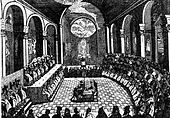
Back Konzil von Vienne ALS مجمع فيين Arabic مجمع فيين ARZ Conceyu de Vienne AST Concili de Viena Catalan Viennský koncil Czech Konzil von Vienne German Koncilio de Vieno EO Concilio de Vienne Spanish Viennen kirkolliskokous Finnish
| Council of Vienne | |
|---|---|
 | |
| Date | 1311–1312 |
| Accepted by | Catholic Church |
Previous council | Second Council of Lyons |
Next council | Council of Constance |
| Convoked by | Pope Clement V |
| President | Pope Clement V |
| Attendance | 20 cardinals, 122 bishops, 38 abbots (several more were barred by Philip IV of France) |
| Topics | Knights Templar |
Documents and statements | Knights Templar disbanded, King Philip absolved of actions against Pope Boniface VIII, crusade declared (but never carried out) |
| Chronological list of ecumenical councils | |
| Part of a series on the |
| Ecumenical councils of the Catholic Church |
|---|
 |
| 4th–5th centuries |
| 6th–9th centuries |
| 12th–14th centuries |
| 15th–16th centuries |
| 19th–20th centuries |
|
|
The Council of Vienne was the fifteenth ecumenical council of the Catholic Church and met between 1311 and 1312 in Vienne, France. This occurred during the Avignon Papacy and was the only ecumenical council to be held in the Kingdom of France (the previous 2 had been held in Lyon, which was under the Kingdon of Burgundy). One of its principal acts was to withdraw papal support for the Knights Templar at the instigation of Philip IV of France. The Council, unable to decide on a course of action, tabled the discussion. In March 1312 Philip arrived and pressured the Council and Clement to act. Pope Clement V passed papal bulls dissolving the Templar Order, confiscating their lands, and labeling them heretics.
Church reform was represented by the decision concerning the Franciscans, allowing abbots to decide how to interpret their Rule. The Beguines and Beghards of Germany were condemned as heretics, while the council forbade marriage for clerics, concubinage, rape, fornication, adultery, and incest.
The council addressed the possibility of a crusade, hearing from James II of Aragon and Henry II of Cyprus, before deciding to assign Philip of France as its leader. It was through Philip's influence that Clement finally canonized Pietro Angelerio, taking care not to use his papal title Celestine V. The final act of the council was to establish university chairs for Greek, Hebrew, Aramaic and Arabic languages.
